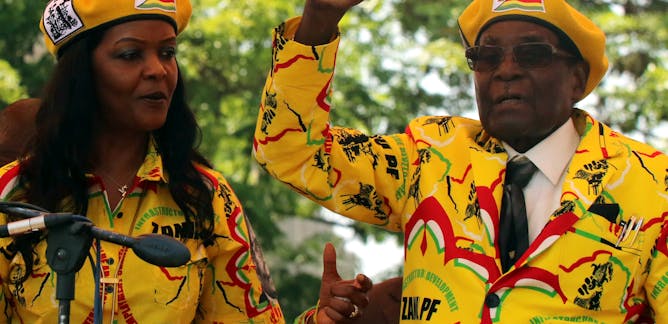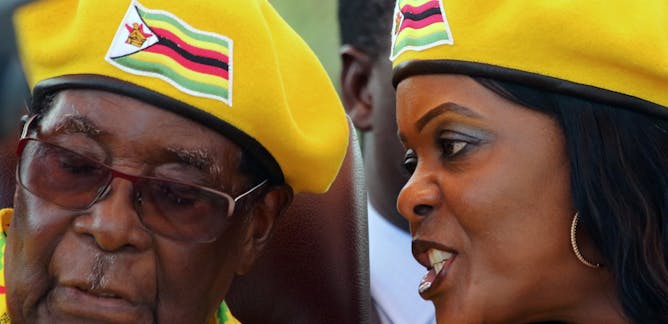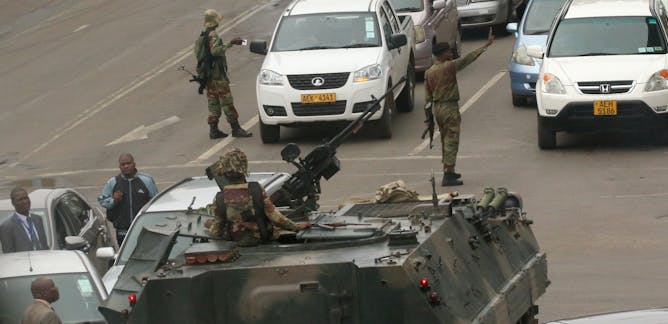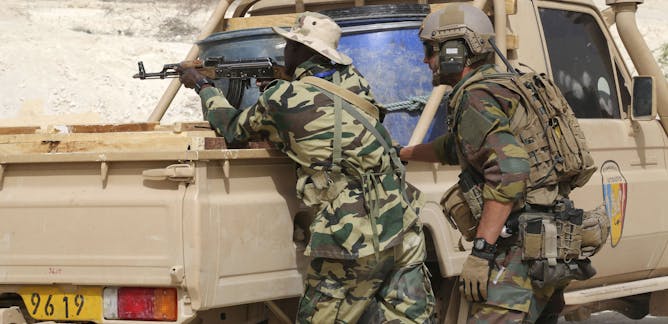| |
|
|
|
|
|
|
| |
|
Editor's note
|
|
Zimbabwe’s military seems to have staged a coup against President Robert Mugabe, who has ruled since independence in 1980. The move was precipitated by the firing of Vice President Emmerson Mnangagwa. David B. Moore ponders what’s next for the country that’s been in political and economic turmoil since the early 2000s. With Mugabe’s long reign seemingly over, Steven Feldstein discusses how development in the southern African state has stagnated and what toppling him will mean for the country in the longer term. Meanwhile,
James Hamill argues that the events of the past few days have formally stripped away any pretence that Zimbabwe is a constitutional state.
In early October, four American soldiers were killed and two wounded in Niger. The incident reaffirmed the need to ask important questions about US military presence in foreign territories - especially in Africa. Craig Bailie explains.
|
Thabo Leshilo
Politics + Society Editor
|

|
|
Top Stories
|

David B. Moore, University of Johannesburg
The protracted political crisis in Zimbabwe has worsened since President Mugabe fired vice president Emmerson Mnangagwa. Now the military has entered the fray, raising fears a coup is imminent.
| |

Steven Feldstein, Boise State University
Mugabe and his powerful wife have been overthrown in an apparent coup orchestrated by Zimbabwe's vice president. Will the country transition into democracy or get strapped with yet another dictator?
|

James Hamill, University of Leicester
The coup in Zimbabwe's means that Mugabe’s long and disastrous presidency is finally over. The questions that remain are the precise details and mechanics of the deal which secures his departure.
| |

Craig Bailie, Stellenbosch University
The deaths of four American soldiers in Niger last month highlighted the nature and implications of US military presence in Africa.
|
|
|
Politics + Society
|
-
Erica Lawson, Western University
Thousands of Liberian women have banded together to bring about peace and to fight for women's rights. They've changed the face of the African nation.
-
Brendon J. Cannon, Khalifa University
Kenya faces a serious threat of terrorist attacks given its strategic geopolitical position, its tourism and corruption. The country needs to squarely face this and take appropriate measures.
-
Donna Hornby, University of the Western Cape
Farm dwellers' conclusion is that the politics associated with land is not about an organised emancipatory movement. Farm dwellers are mainly preoccupied with daily survival strategies.
|
|
Science + Technology
|
-
Calestous Juma, Harvard University
In a remarkable extension of technological leapfrogging, Somaliland will become the first country in the world to use iris recognition in a presidential election.
-
Calestous Juma, Harvard University
Jobs are not created or lost because of a single technology, but because of the business models designed to leverage the power of it.
|
|
Environment + Energy
|
-
Dirk Swanevelder, The Agricultural Research Council; Annemarie Gous, The Agricultural Research Council; Connal D. Eardley,, The Agricultural Research Council; Sandi Willows-Munro, University of KwaZulu-Natal
Pollination in South Africa's ecosystems is extremely complex. However new advances such as pollen metabarcoding help us understand interactions between pollinators and pollen.
-
Surina Esterhuyse, University of the Free State
A vulnerability map could help assess the risks associated with fracking and groundwater which around 300 towns depend on in South Africa's Karoo.
|
|
Business + Economy
|
-
Ben Cousins, University of the Western Cape; Ruth Hall, University of the Western Cape
There is very little clarity as to who owns what land in South Africa. A lack of reliable data and statistics doesn't help.
-
Dr Phumudzo S. Munyai, University of South Africa
The business of sport in South Africa is coming under the focus of the Competition Commission on concerns that some practices may be uncompetitive.
-
Seán Mfundza Muller, University of Johannesburg
The imposition of the fee free higher education proposal on South Africa's National Treasury without due consideration represents an escalation of the state capture led by President Jacob Zuma.
|
|
Health + Medicine
|
-
Andrew Dillon, Michigan State University; Pieter Serneels, University of East Anglia; Sarah A. Kopper, Michigan State University
Health investments raise worker productivity, but firms may not observe changes in worker effort. Technology that measures physical activity demonstrates these potential gains.
-
Louise Makau Barasa, Eastern University ; Nicholas A. Abinya, University of Nairobi
There is an urgent need for affordable cancer treatment services, lower drug costs, better equipped facilities, favourable national cancer policies and specialist doctors in Kenya.
-
Rajendra Maharaj, South African Medical Research Council
A spike in the number of malaria cases in southern Africa means that the region will not meet its initial target of eliminating malaria by 2018.
|
|
Education
|
-
Anneke Newman, University of Sussex
The assumption that children’s schooling decisions are mainly decided by their parents, and their fathers in particular, is not entirely accurate.
-
Laura Stark, University of Jyväskylä
Creating more opportunities for young women and girls to work and earn money is a possible solution to early marriages. Subsidising secondary education to keep poorer girls in school is another.
-
Rian de Villiers, University of Pretoria
Policy needs to focus on making the teaching profession stable and more appealing. South Africa must ensure its locally trained teachers have more reason to stay in the country.
|
|
Arts + Culture
|
-
Charles Villet, Monash University
South Africans supporting visiting New Zealand rugby teams took root in a tumultuous time as an expression of defiance against apartheid.
|
|
| |
| |
| |
| |
| |
| |
|
|
|
|
|
|
| |